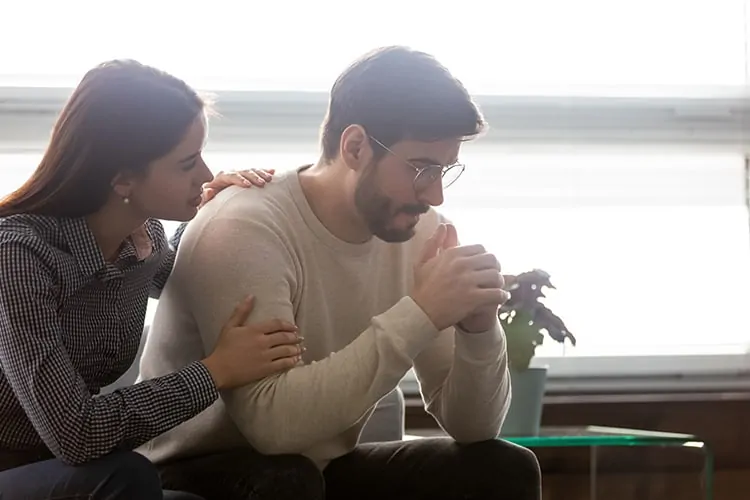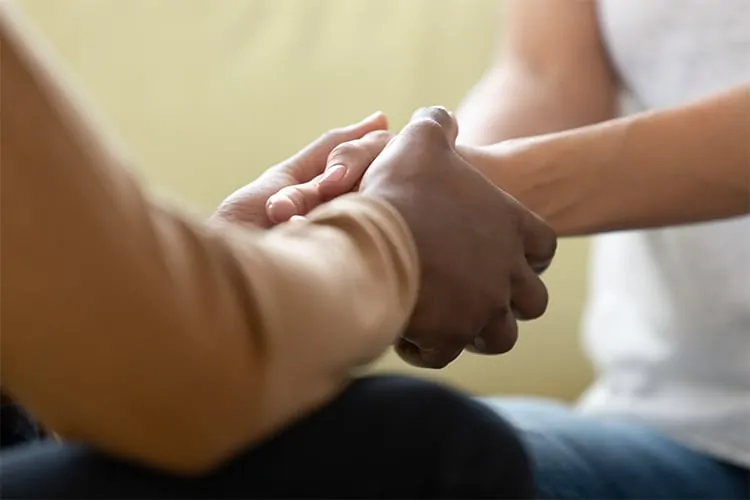A miscarriage is an experience which effects both the man and the woman in a relationship. This article tells you about the man's side of a baby loss and how it can be a lonely limbo.
Baby loss happens every day but men hardly ever talk about it. I learnt this when my former partner and I lost three babies over three years and I was looking for some sign that I wasn’t the only man to feel the way I did about what happened to us.
I felt like a misfit, in a lonely limbo between happy bachelor and family man. I didn’t belong anywhere and because men don’t discuss it, I felt like I was the only wannabe Dad in the world.
Everyone seemed to know others who had been through it, but knowledge or understanding of the man’s story seemed to be almost non-existent. The whole issue loomed large like the great unspoken topic of our gender.
In going through the miscarriages with my partner I had the time and the first-hand experience to reflect on why the topic remains so off-limits for many men.

The strong, silent ‘rock’
Firstly, when a couple experience baby loss, the majority of the attention, understandably and correctly, goes to the woman. It’s easy to see how the man’s feelings can be overlooked.
Added to this is the fact that men will very often take on the self-appointed role of the stoic protector, the silent ‘rock’ who will set aside their own feelings in an attempt to shield their partner from any further pain.

This, of course, is highly admirable and the fact that men can be a source of great strength to their partners at this time is something they can be proud of. It gives them a defined role too, which can help to give them a purpose in the day-to-day passage through this painful period.
However, for men and the people around them, it’s worth remembering that they will have their own issues to deal with too. Their hopes, projections and all the mental and emotional preparations for becoming a father that have been brought to an abrupt and untimely halt.
Setting some time aside – both men themselves and those around them – to acknowledge this and to work through their thoughts and feelings can only be a helpful and sensible response. And if nothing else, guys, the better you look after yourself, the better you can look after your partner.
Hidden paternal instincts
Thinking more broadly about trying to start a family, there’s also the role that masculinity plays in this narrative.
Before the miscarriages, my partner and I were trying for a baby for a number of years without any luck. Trying unsuccessfully to conceive is a similarly unspoken topic amongst men, not least because of the way it is tied in with notions of a man’s virility and how it may be perceived as a ‘weakness’.
It can take a great deal of courage to speak openly about this, both from the perspective of a man’s fertility and also on the more emotional side of a man declaring his intentions to be a father.
It’s a great deal rarer to hear a man talking openly about wanting to be a dad than it is to hear a woman speaking about her desires to become a mother.

Men can hide their paternal urges in the slipstream of their partner’s higher profile maternal instincts. Which means they can choose to keep their feelings and aspirations to themselves if things don’t go according to plan.
While this can protect them from being emotionally exposed it almost certainly perpetuates more silence on the male side of the story and leads to a continued lack of understanding of how men really feel when their paternal instincts are challenged or curtailed.
Still a taboo topic
Taking a further step back, another thing I learned is that there isn’t a realistic broader discourse in our society that accurately reflects losing a baby. It’s still a taboo topic that the vast majority of us have a huge problem addressing.
With the death of a loved one, for example, there’s a framework there to make sense of it all – for people going through it and for those supporting them. People know their roles and the protocol exists for a reason: to comfort the grieving family and guide the behaviour of those around them.
Losing a baby is a rarer occurrence – unlike death it doesn’t happen to everybody – but it happens to enough people for it to be more accepted and for us to try not to be so fearful of addressing it. This would make things easier for everyone but it isn’t something that can be willed into existence overnight.
The stakes are high and no one wants to do or say the wrong thing. But it’s ironic that in a world where emotional sharing is the norm and subjects like sex and death are no longer taboos, we should still be struggling to talk openly about losing a baby in a way that reflects how regularly it occurs.
A more helpful balance between the privacy and the openness would allow us as a society to be more present to give people the support and understanding they need when as they go through this painful but all too common human experience.
Richard Ellis has written a book, The Phantom Father, about the man’s side of baby loss and facing up to a future without fatherhood: https://phantomfather.com/



